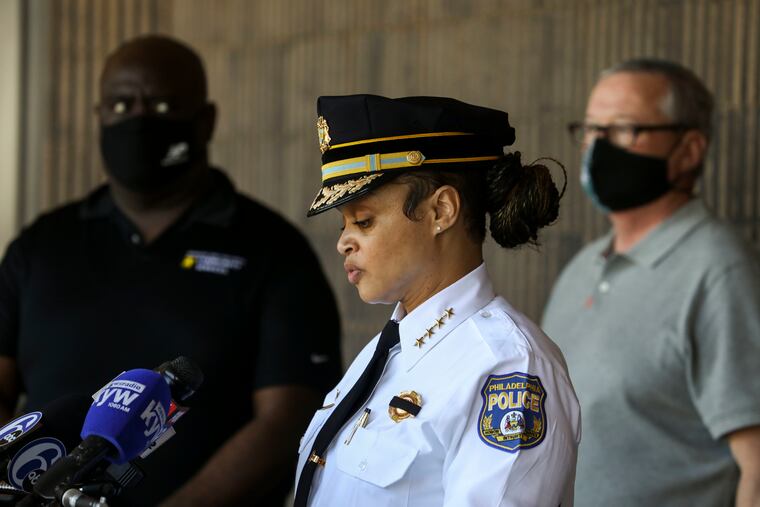A man said he was too drunk to be responsible for his racist threats to Danielle Outlaw. A jury didn’t agree.
Peter Fratus, 39, argued at his trial that he was blackout drunk and had no recollection of sending the messages. A federal jury rejected that defense.

A Massachusetts man who sent racist and threatening emails to Philadelphia Police Commissioner Danielle Outlaw last year was convicted Wednesday by a federal jury that rejected his defense that he was blackout drunk, had no memory of writing them, and should not be held criminally responsible.
Peter Fratus, 39, of West Dennis, had taken the witness stand in his own defense, sitting slump-shouldered and recounting the moment when FBI agents showed up at his home to question him over the June 2020 messages, which included racial slurs and vague threats about hanging or killing Black people.
“I had no recollection of sending any emails to anyone in Philadelphia or the Philadelphia police,” said Fratus, who is white. “I have no connection to Philadelphia. It made no sense to me.”
Nevertheless, prosecutors produced evidence that showed Fratus had searched Outlaw’s name on the internet several times in the minutes before sending the emails. Only months before, she had been named the first Black woman to lead the 6,000-member police force and her efforts to lead the department through that spring’s protests over the police killing of George Floyd in Minneapolis had increased her national profile.
At the time, Fratus was also under investigation by the Massachusetts State Police for leaving menacing voice mails for the state’s attorney general, Maura Healey, in which he threatened to slit her throat.
Threats he made in 2018 against Rep. Maxine Waters (D., Calif.) — including lynching Black members of Congress — had also drawn FBI scrutiny. And on the same day that he contacted Outlaw, the evidence showed, Fratus also left anti-Semitic voice mails for an Orthodox Jewish charity in Ocean County, N.J., threatening to kill children at a day camp affiliated with the nonprofit.
Testifying Tuesday, Fratus looked mortified when confronted by the recordings and said he was “completely disgusted” by the contents of the emails sent to Outlaw. He said he was suffering from alcoholism at the time, drinking a liter-and-a-half of vodka a day and routinely blacking out for hours at a time.
“I have no recollection of sending [them],” he said of the Outlaw emails. “I couldn’t tell you what my intent was.”
Courts have recognized intoxication as a defense in very limited circumstances involving charges where proof of intent is required for a conviction. Typically, a defendant must show, as Fratus argued at his trial, that he was so intoxicated that he could not have consciously intended to commit the crime in question.
But Assistant U.S. Attorneys Robert J. Livermore and Sarah M. Wolfe countered by arguing that the same night he sent the messages, Fratus was texting and calling others and had sent emails suggesting he was coherent at the time — even if he couldn’t recall the next day what he had done.
FBI agents testified that when they first confronted Fratus with the messages last year, he denied sending them and then said that even if he had, he was just exercising his First Amendment rights and had no intention of actually following through on his threats.
Judges who have previously reviewed Fratus’ conduct haven’t been so sure. In addition to his habit of mouthing off while drunk, he has a history of violent behavior while intoxicated — including a series of attacks on Black women, the homeless, and police dating back to 2011.
He was on probation after being convicted of assaulting police officers in Massachusetts at the time of his emails to Outlaw — a fact that, combined with those earlier attacks, prompted a federal magistrate judge to order him detained after his June 2020 arrest until his trial on charges of sending threatening interstate communications.
U.S. District Judge Gerald J. Pappert, who presided over Fratus’ trial in Philadelphia, kept most of the evidence regarding those past violent incidents out of the more recent proceedings, instead ordering prosecutors to limit their focus to his threats against Outlaw and similar menacing communications Fratus had made in the past.
Fratus faces up to five years in prison when he is sentenced in the coming months.